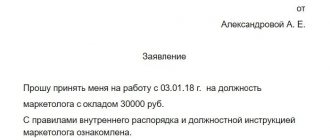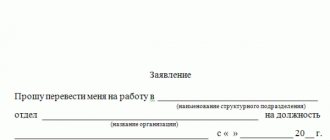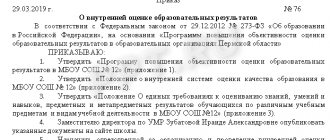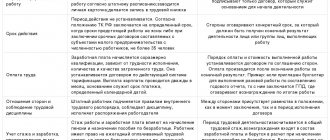Hiring procedure: general rules
Hiring is a standard procedure that every full-time employee of any organization goes through. The general rules for hiring in Russia are established by the Labor Code. The entire 11th chapter of the Labor Code of the Russian Federation is devoted to this topic.
| Question | Where to find the answer |
| Age at which employment is permitted under an employment contract | Art. 63 Labor Code of the Russian Federation |
| Guarantees of the parties when concluding an employment contract | Art. 64 Labor Code of the Russian Federation |
| Conclusion of an employment contract with former municipal and government employees | Art. 64.1 Labor Code of the Russian Federation |
| Documents to be presented when applying for a job | Art. 65 Labor Code of the Russian Federation |
| Registration of a work book | Art. 66 Labor Code of the Russian Federation |
| Registration of an employment contract | Art. 67 Labor Code of the Russian Federation |
| Actual admission to work by an unauthorized person and the consequences of such a decision | Art. 67.1 Labor Code of the Russian Federation |
| Registration of employment | Art. 68 Labor Code of the Russian Federation |
| Pre-employment medical examination | Art. 69 Labor Code of the Russian Federation |
| Employment test | Art. 70 Labor Code of the Russian Federation |
| Evaluation of the test result established during employment | Art. 71 Labor Code of the Russian Federation |
Standard hiring algorithm: 5 stages
Stage 1. Familiarization with the documents presented by the employee Article 65 of the Labor Code of the Russian Federation gives the employer the right to request a passport or other identification document, certificates and diplomas of professional training received, a work book and SNILS (if the employee is employed for the first time, the work book and SNILS are created by the personnel officer when hiring). For those liable for military service, military registration documents are also added to this list, and for applicants for certain specific positions - additional certificates, licenses, permits, etc. in accordance with current legislation.
Stage 2. Familiarization of the employee with local regulations related to his work. We are talking about internal labor regulations, collective agreement, job description, regulations on remuneration and other legal regulations at the discretion of the employer. This must be done before, and not after, the conclusion of the employment contract. Make sure that the employee signs each sheet of information and give him a printed copy of the job description to keep at the workplace.
Stage 3. Conclusion of an employment contract One copy, certified by the signatures of the parties, remains with the employer, the other is given to the employee. If you are hiring a former state or municipal employee who left the service less than two years ago, send written notice of this to his last place of employment.
Stage 4. Preparation of related documents Some must be filled out (for example, an employment order or a personal card), others - depending on the situation. Please note that the law obliges government agencies to prepare a number of documents that are not required for private enterprises, such as a personal file or a job application.
Stage 5. Introductory and preliminary briefing on labor protection is carried out. Only after this the employee can be allowed to perform job duties.
Each company has the right to establish its own procedure for applying for a job, expanding this list with additional procedures and conditions. Some employers conduct questionnaires or polygraph tests on applicants, while others request a detailed autobiography. And to fill some positions you have to undergo a medical examination or psychiatric examination. But everyone has to perform the legally established minimum of actions. Otherwise, the employment procedure is considered to be completed with errors, and the employer faces a large fine.
How to register an employee under an employment contract
- Receive the necessary documents from the employee:
- passport or other identity document;
work book (you don’t have to ask for it if the employee comes to you part-time);
- insurance certificate of state pension insurance (SNILS);
- military registration documents - for those liable for military service and persons subject to conscription for military service;
- a document on education, qualifications or special knowledge - when applying for a job that requires special knowledge or training.
- Receive an application from the employee (job application template).
- Draw up and sign an employment contract. When drawing up a contract, rely on Article 57 of the Labor Code. Draw up the agreement in two copies: one will remain with the employee, and he will sign the second and return it to you. At the end of the employment contract, it is advisable to make a note: “A copy of the employment contract has been received/signed, transcript.”
- Familiarize the employee, against signature, with the internal regulations of the organization, if any (job descriptions, regulations on labor protection, trade secrets, etc.).
- Issue an order for employment in the T-1 form. The date of the order cannot be earlier than the date of the employment contract. The employee must sign the order.
Admission order template
- Issue a personal employee card in form T-2. It is better to print it on thin cardboard or thick paper.
Card template
- Make an entry in the work book within a week from the date of hiring.
If your company is the first place of work for an employee, and he does not yet have a work book and insurance certificate, then you will have to obtain them.
Preparation of documents when applying for a job
Concluding an employment contract is only half the battle. Before allowing a new employee to work, you should include him in the company’s accounting documents, create a personal card, and fill out a work book.
6 documents that are required when applying for a job
Application for employment . It is not always required, since from the point of view of the law this stage is not considered mandatory and many employers ignore it. But if this norm is enshrined in local regulations and company instructions, ask the applicant to write a job application. The document is drawn up in free form or according to the sample proposed by the employer.
Employment contract . A fixed-term or open-ended agreement between an employee and an employer, giving an official start to the employment relationship. Apply every time you hire a new employee (even if it is temporary, seasonal or remote). Before certifying the contract, make sure that it contains all mandatory terms and information about the parties.
| Attention! If you forgot to include one or more mandatory conditions in the employment contract, enter into an additional agreement with the employee as soon as possible and write down the missing clauses in it. |
The order of acceptance to work . A mandatory document issued on the basis of an employment contract. Fill out form No. T-1 or a form developed by the employer. Make sure that the contents of the order - job title, salary, nature of work, information about the employee - exactly correspond to the terms of the employment contract, and submit it to the head of the organization for signature. Familiarize the newcomer with the certified order against signature within three days after actual admission to work, and if necessary, hand over a copy.
Employment history . When applying for a job, the applicant brings it to the HR department, where it is subsequently filled out and stored. Make a record of employment within a week after the order is issued. To avoid mistakes, follow the instructions approved by Resolution of the Ministry of Labor of Russia No. 69 of October 10, 2003.
Personal card . It is mandatory to start for each new employee and is maintained until his dismissal. Take as a basis the unified form No. T-2, containing 11 sections, or a locally approved equivalent. Fill it out not according to the employee, but only based on official documents:
- passports;
- work book;
- employment order;
- SNILS;
- military ID; diplomas, certificates, etc.
Please note that the employee must certify the information entered in sections I-III with a personal signature. Therefore, it is impossible to maintain cards exclusively in electronic form. But no one prohibits duplicating data stored on paper in digital form and printing it out if necessary.
| Attention! The rules for hiring civil servants require that in addition to a personal card, a personal file should be opened for the employee. Commercial organizations conduct personal affairs on a voluntary basis - for example, to systematize data on the work activities of staff. |
Time sheet . Reflects the amount of time actually worked by staff. Enter the newcomer’s data into the report card (unified form No. T-12 or No. T-13). Do not take into account only employees performing work under civil contracts and external part-time workers.
Introduction
All features of hiring are described as correctly and accurately as possible in the TCRF. We recommend that you study chapters 10 and 11 of the code to understand all the nuances of drawing up an employment contract. Also read Article 66 of the Labor Code and Decree of the Government of the Russian Federation No. 225 “On Labor Books”.
The first step is to interview and select applicants
This will allow you to understand the process of registering employees and preparing primary documentation when hiring.
Note:
The rules and regulations of the Labor Code of the Russian Federation are valid in all federal entities. All employees are registered in the same way: seasonal, temporary, part-time, permanent.
Recruitment is carried out according to the following scheme:
- The applicant is interviewed, you determine his competence and examine his resume.
- If the applicant suits you, then he brings all the necessary documents for consideration.
- The applicant writes a job application, indicating the relevant position.
- The employee is familiarized with regulatory documents, work procedures, internal regulations, workplace, and team. In some cases, familiarization is done against signature.
- An employment contract is drawn up and signed by both parties. An employment contract can be standard or modified to suit the realities of the enterprise.
- An order is issued to hire a new employee. The order is mandatory, since its number is recorded in the work book.
- An employee of the HR department or the entrepreneur himself fills out a card for the employee. It is compiled according to the classical form No. 2.
- After filling out the card, OK draws up a personal file for the employee and makes an entry in his employment record. All employee documents are stored in the HR department - they must be reliably protected from loss.
Procedure for hiring minors
Legal adulthood in Russia begins at the age of 18. But the right to work appears much earlier - from the age of 14, and in exceptional cases, for example, to participate in the filming of a film, from a younger age. If the applicant is not yet 18 years old, employment is formalized according to special rules established by Article 63 of the Labor Code of the Russian Federation.
You can employ minors:
- from 16 years of age - on a general basis, but only to perform work that cannot cause physical or mental harm, and with a mandatory medical examination;
- from 15 years old - with the same restrictions + subject to receiving a general education and only light work in free time from school;
- from the age of 14 - with the same restrictions as from the age of 15, and with the written consent of one of the parents (guardians) and the guardianship authorities.
Young children and teenagers under 14 years of age can only be recruited to work by certain organizations: concerts, cinema, theater, circus, sports (Article 63, 348.8 of the Labor Code of the Russian Federation). Since such a young employee does not yet have the legal right to sign an employment contract on his own, all documents are drawn up for him by his parents or guardians. The consent of the guardianship authorities is first requested, who must ensure that working conditions comply with the norm, and the assigned work will not harm the moral and physical health of the child.
Regulations for hiring part-time workers
The procedure for hiring part-time workers is determined by the type of part-time job - external or internal. If the part-time job is external, the employee is not required to present a work book, since it is already stored at the place of main work. You do not have to make a record of additional employment. But if the employee himself asks for this, give him a certified certificate, an extract or a copy of the employment order so that he can transfer it to the place of main employment. Don’t require SNILS or a military ID either: a passport or other identification document is enough (Article 283 of the Labor Code of the Russian Federation).
As a rule, no documents are requested from an internal part-time worker - there is no need. The employee is already on the staff of the enterprise, which means he provided all the necessary information at the stage of his first employment. But if a part-time position requires certain knowledge, skills or clearances, feel free to request diplomas, certificates and other documents confirming their availability.
Otherwise, the procedure does not change. A written employment contract (the main basis for hiring) is concluded with the condition of part-time work, an order is issued, the employee is introduced to the regulatory documents and given instructions on labor protection at the new, although not the main, workplace.
| Attention! Persons under 18 years of age cannot be hired for part-time work, even if it is just a few working hours a week. |
Comments on the algorithm for hiring an employee
We carry out preparatory activities
The employment process begins with selecting a suitable employee from the applicants. Once a candidate has been identified, a number of steps must be taken before the actual application process begins.
1.1. Interview. Helps to identify the most preferred candidate from several.
1.2. Obtaining documents and information necessary for applying for a job. It is important to remember that there is information that only the employee himself can report. For example, information about the right to personal income tax deductions from future salaries or the right to special working conditions. Therefore, it is recommended to inform the new employee about the provision of such data already at this stage.
1.3. Verification of documents and information received from the employee. This is also an important stage, since providing false information during employment entails dismissal under Art. 81 of the Labor Code of the Russian Federation, as well as possible criminal liability for the employee. The depth and thoroughness of the review usually depend on the employee's future position, duties and responsibilities.
Applying for a job with a probationary period
It happens that an employee is suitable in all respects - education, experience, personal qualities - but the employer, even after several interviews, is not sure that the newcomer will successfully cope with the assigned work. And if we are talking about a responsible position, getting rid of doubts is doubly difficult. Fortunately, just for such cases, the Labor Code provides a special option - a probationary period.
To schedule a pre-employment test:
- Make sure it is not prohibited by law . It is impossible to establish a probationary period for pregnant women and mothers of children under 1.5 years of age, teenagers under 18 years of age, yesterday's students entering work for the first time in their specialty, persons hired by competition, and some other categories of workers.
- Determine the length of the probationary period . This indicator is influenced by the duration of the employment contract and the nature of the position held by the employee. For example, when hiring under a contract valid for 2 to 6 months, the duration of the trial should not exceed 2 weeks. If the contract is indefinite, the trial can last up to three months, but for executive employees - directors of organizations and branches, their deputies and chief accountants - the maximum period is increased to six months.
- Include a probationary clause in your employment contract . This must be done at the time the document is drawn up: as soon as it is signed, it will no longer be possible to set a probationary period retroactively or increase its duration. If the parties have not discussed and included a corresponding condition in the employment contract in advance, the employee is considered accepted for the position without a trial.
Commentary on Article 65 of the Labor Code of the Russian Federation
Another group of restrictions covers situations related to the employer’s demands for the employee to provide documents necessary for concluding an employment contract and documenting employment. In this regard, let us comment on Article 65 of the Labor Code of the Russian Federation, which defines the basic list of documents that a person applying for a job must present to the employer. Such documents include:
passport (other similar document) identifying the person applying for work;
employment history;
insurance certificate of state pension insurance;
military registration documents - for those liable for military service, as well as persons subject to conscription for military service;
a document on education, qualifications or special knowledge - when applying for a job that requires special knowledge or special training.
However, in some cases, in order to conclude an employment contract, it may be necessary for the person applying for work to present additional documents. The corresponding requirements in this regard are established by federal laws, decrees of the President of the Russian Federation and decrees of the Government of the Russian Federation based on the specifics of the work (labor function) that is supposed to be entrusted to the person applying for work.
It is prohibited to demand from a person applying for a job documents other than those provided for by the Labor Code of the Russian Federation, other federal laws, decrees of the President of the Russian Federation and decrees of the Government of the Russian Federation. In connection with the last remark, we emphasize that the employer, in order to obtain from a person applying for work, any additional documents in connection with the conclusion of an employment contract, does not have the right to refer to any other legal acts, except for those listed above, since such requirements cannot be established either by the laws of a constituent entity of the Russian Federation, or by resolutions of ministries (departments), or by decisions of territorial (local) authorities.
It should be noted that Federal Law N 90-FZ added part 5 to the commented article, according to which, if a person applying for work does not have a work book due to its loss, damage or for any other reason, the employer is obliged, upon a written application of this person (indicating the reason for the absence of a work book) issue a new work book.









